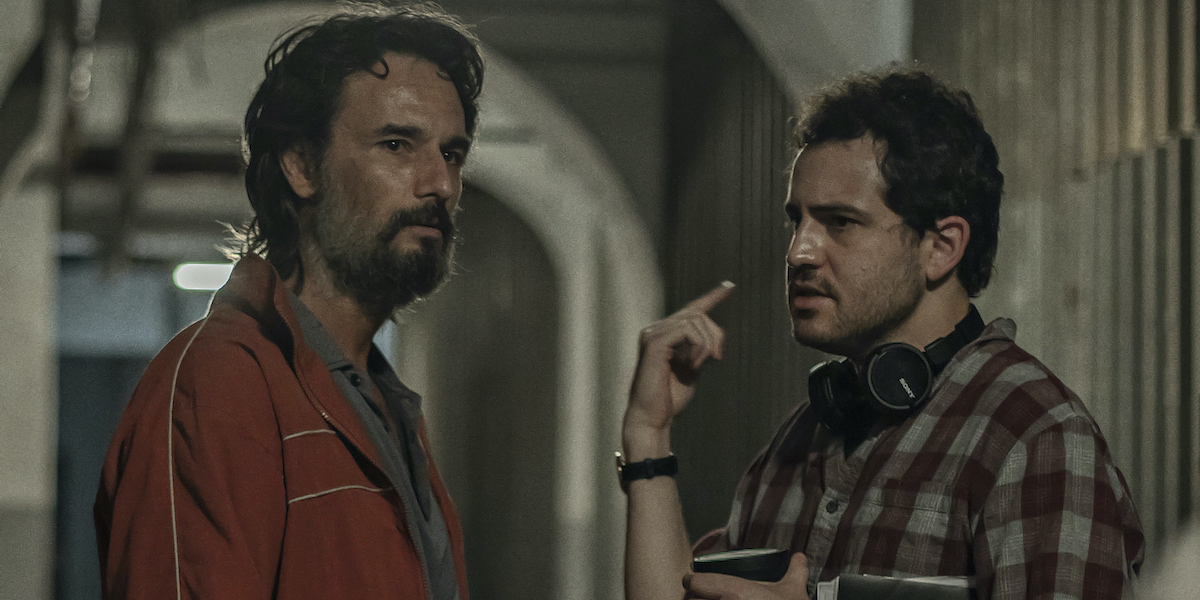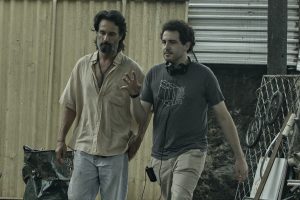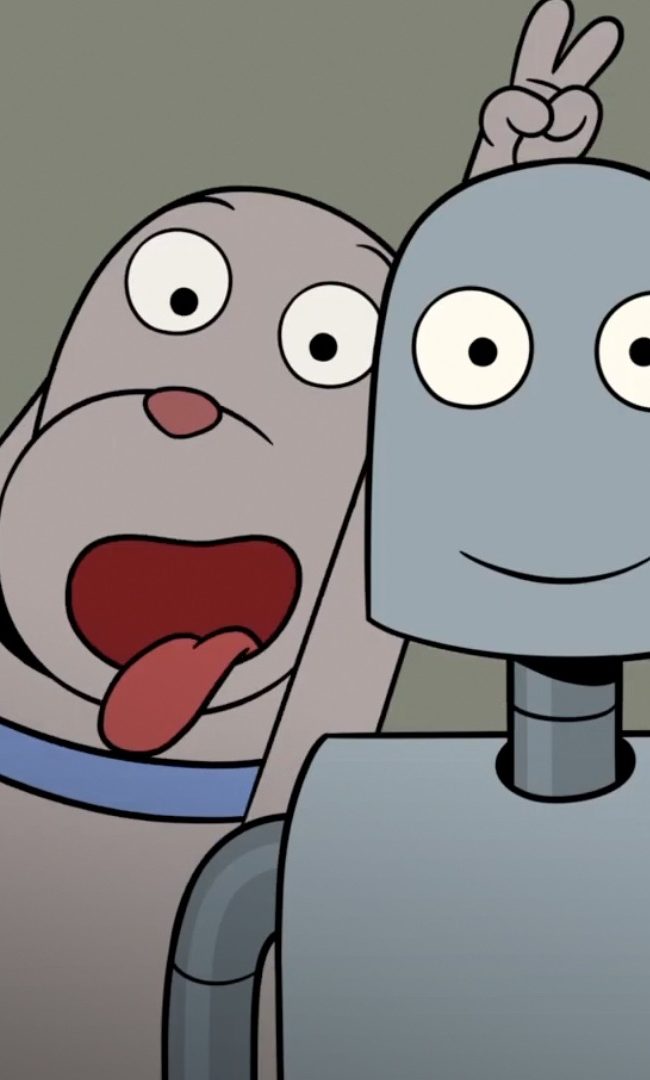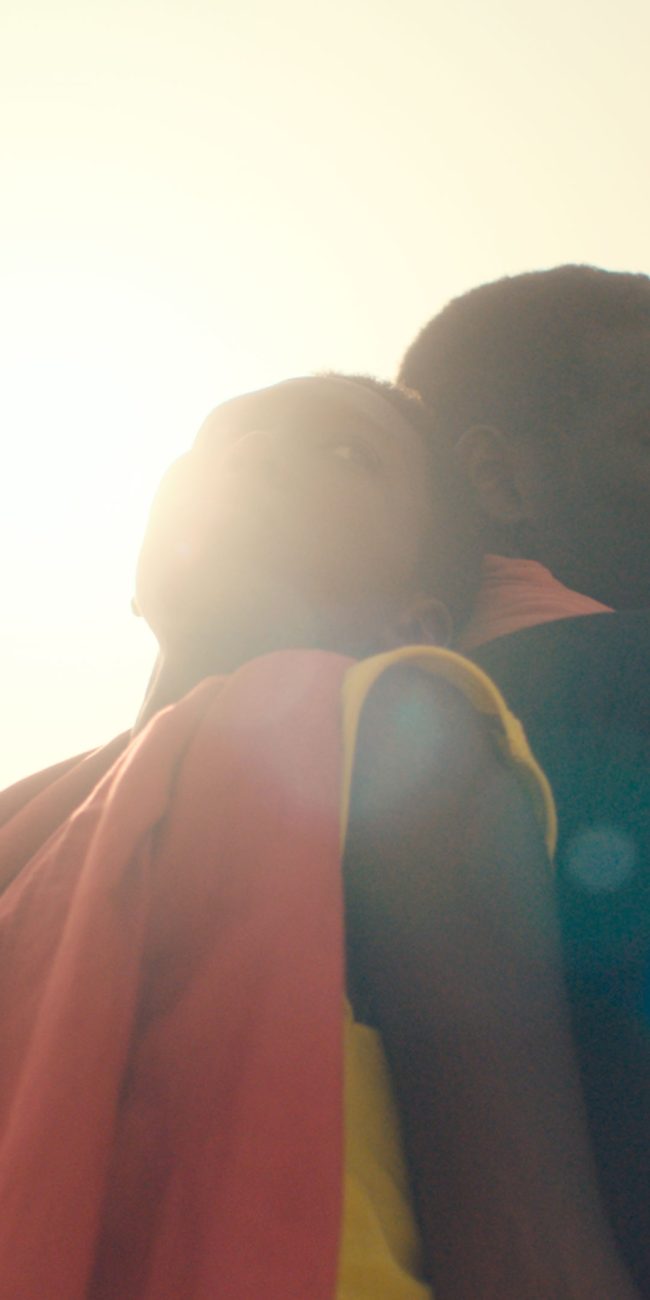A Conversation with Alexandre Moratto (7 PRISONERS)

I recently watched 7 Prisoners (which I also reviewed), slated for a November 11 release on Netflix, at the 2021 Middleburg Film Festival, where I also had a chance to interview its director, Alexandre Moratto (Socrates). Raised both in the United States and Brazil, Moratto has here created a hard-hitting dramatic thriller about modern-day slavery. Set in São Paulo, the movie follows young Mateus (Christian Malheiros, Socrates) as he struggles to free himself of the bondage imposed on him by Luca (Rodrigo Santoro, Last Call), the ruthless owner of a junkyard. The film was co-produced by noted directors Ramin Bahrani (The White Tiger) and Fernando Meirelles (The Two Popes). Here is a condensed digest of our conversation, edited for length and clarity.
Hammer to Nail: Could you please explain your background? You are both Brazilian and American, and studied at UNC…?
Alexandre Moratto: UNC School of the Arts in Winston-Salem. So, I was born in the U.S. My mom is Brazilian, my dad’s American. And so I was raised like a third-culture kid where my parents were divorced at a very young age. I was raised primarily by my mom, and we only spoke Portuguese at home. It was my first language. I have had a Brazilian passport my whole life. My mom and I were always, and still are, very close to our family in São Paulo and we would go every year and spend three months during summer vacations. She was a schoolteacher and I was a student growing up, obviously, so our schedules would align.
Then I did some high school in São Paulo and actually that’s where I first met Fernando Meirelles, who’s a producer on the film. His daughter was studying at the same school that I was studying at, so he actually came to the school with his movie City of God, fresh off Cannes. He had just been nominated for the Academy Award. It was a very huge, momentous time for him in Brazilian cinema, and here he is at my school! I’m 14, and I walk up to him and I tell him I’m Alexandre Moratto and I’m going to be a filmmaker. And I remember he looked at me with this huge beaming smile and talked to me for 10 minutes and gave me some advice. And I thought that was so generous of him. But then we never kept in touch because I came back to the U.S. to finish school here, go to college, and I skipped a grade.
So at 17, I’m at UNC School of the Arts studying film, and Ramin Bahrani comes to town, needing interns for his third film, Goodbye Solo. And he was actually born and raised in the town where my school was and he needed people who were 18 and over and who spoke Spanish. I was 17 at the time, and I didn’t speak Spanish, so I lied. (laughs) I said, “Oh, of course, yes, I speak Spanish, and fluently. And yes, I’m 18.” But it’s okay, because the lie ended up becoming the truth. I turned 18 and I learned Spanish doing the job. (laughs)
With Ramin, he really just took me under his wing, or more like I put myself under his wing, and we really got along well. I just was so blown away by Chop Shop, his second film. It reminded me of Pixote, the great Brazilian film by Hector Babenco, one of my favorite films of all time. So I knew I wanted to learn from him, and he taught me how to go into all the communities that we were working in and how to find interesting people and cast. So I learned so much from him about how to be the kind of filmmaker I wanted to be.
HtN: This is your second feature. Where did the specific idea for this story come from?
AM: Well, I was finishing Socrates in 2017 in São Paulo. And we were doing postproduction at Fernando Meirelles’ company. That’s how we actually got back in touch and how he got involved in this new project. But we’re there, we’re doing the postproduction, I’m having some trouble sleeping one night, which is pretty normal for me, and I turn on the TV and see some footage about modern-day enslavement and human trafficking in Brazil. Now you have to keep in mind, São Paulo is a global alpha city, and here is some footage of a young man, literally chained. He had a chain to his ankle and, and this is the 21st century! And I just couldn’t believe my eyes. I couldn’t believe what I was seeing. So I couldn’t look away. When I see things that bother me or disturb me, I actually think it’s more important to face them.

Rodrigo Santoro & Alexandre Moratto on set for 7 PRISONERS
So I looked head-on and just dug and dug and did a lot of research. I read every book, every article I could possibly find. I spoke with journalists who’ve dedicated their careers to covering this topic. And it really all culminated with a friend of mine, who had partnered with the UN and Brazil’s Department of Labor, talking to survivors of human enslavement. I met with many survivors, I heard their stories, I spent a week with them shadowing my friend, and it was just a very profound experience. So, with the film, I hope that I can transmit what I learned firsthand, so audiences can feel the struggle that people who are enslaved go through.
HtN: I really appreciated the ending of your film and the direction it went, how you show that the cycle is continuing, as opposed to one way you could have gone. I was really hoping that you would go in that direction, and I’m glad you did. Did you think about doing a different ending?
AM: Yes, I did think about a different ending. We had discussed, I think, four or five different endings. Me, my co-writer Thayná Mantesso, and Ramin Bahrani. We were just mulling it over for many months, and we could have gone towards the more, I guess you could say, Hollywood ending of the story, but there was just an instinct in all of us that that wouldn’t be right for this film. And I was thinking a lot about City of God and how that film beautifully shows the cycles of violence and corruption. And I was just thinking about how enslavement has been a part of our history since the beginning of time. There’s a reason all the characters have biblical names. That’s a nod to the Bible and how we read about enslavement as early as the Old Testament.
So it’s something that is almost like it’s in our DNA, somehow. And it’s disturbing to me, but it’s just a fact of our history. So I was thinking about the cyclical nature of power, the cyclical nature of enslavement. And in the ending of City of God, if I remember correctly, I think a gun…somehow, a gun falls down or something, and then the young children pick it up and they run off with it. And I’m like, “Oh my God,” when you see that ending, you’re like, “That’s how crime perpetuates itself in these really, really devastating circumstances that these people are forced to live in.” And so I hoped that my film would do something similar in talking about cycles.
HtN: Well, I think it does. So you mentioned Socrates, which was your first feature. Both that and this star the young actor Christian Malheiros. How did you originally find him?
AM: Christian Malheiros was a young theater actor in São Paulo who had been studying since he was 9 years old. And when I partnered with UNICEF and Instituto Querô to make my first feature, we knew we wanted to cast young people from the local low-income communities because I made that film in an educational setting. So my whole crew were 16- to 20-year-olds from the local communities who had never made a film before. That was the whole crew. And we wanted the cast to also authentically reflect the region. So, I went to all the local high schools and theater programs, and Christian, strangely enough, was the first person I auditioned. I auditioned a thousand other people, and I came back to him because he was a theater actor.
I could tell he had something, but he was acting very big. And at the third or fourth audition, I’m thinking this has to somehow work out. How do I get him to act right for the screen and not for the theater? And I just said, “Listen, Christian, whatever you do, the camera is an X-ray. It’s going to magnify whatever you’re doing, on your face whatever you’re thinking, times 30.” And he looked at me and he nodded. He was like, “Okay, I get it.” And right then and there, he immediately transformed. He did something so subtle, and I kept tapering him down. I said, “Less, less, less.” And I knew he could take direction well, and of course he’s so charismatic and interesting to watch.

Christian Malheiros in 7 PRISONERS
So he got that role, and he really blew up. I mean, he’s still to this day, the first and only Brazilian to get an Independent Spirit Award nomination. And he got it for that film. So here he is, 18 years old, and he is competing with Ethan Hawke and Joaquin Phoenix and Daveed Diggs and John Cho. So it was just a massive moment for him as a really young actor. And after that, he landed an audition for a Netflix series in Brazil. He got the lead. That show became the most watched show on Netflix in the country of Brazil and, I think, maybe Latin America.
HtN: What’s the show?
AM: Sintonia. Massive hit. So he went from like a thousand followers to almost a million. And I actually wrote the role of Mateus for him. I wanted to work with him again. We became friends. And so we kind of built that character together. You know, the African-Brazilian religion that’s depicted in the film where he is praying with the prayer beads, that’s actually Christian’s religion. That’s his own prayer. And so we really worked collaboratively to build his character.
HtN: You cast Rodrigo Santoro as Luca. I’m curious how you landed on him, but I’m also curious about something in his performance that I found very interesting. Because I’ve obviously seen him in other things. In your film, he seems to always be lurching a little bit. There’s a way he walks. He seems like either somebody who’s just drunk far too much in his life and therefore that’s taken a toll, even though he’s still a relatively youngish man, or he’s just always slightly under the influence of something.
AM: Or maybe he’s just smoked too many cigarettes.
HtN: Yeah. How did you cast him? And how did you come up with that?
AM: That’s usually the first question I ask an actor: “How are you going to walk?” I asked Christian that question. I asked Rodrigo that question. And that’s something we build collaboratively. I think that how the person is going to walk reflects a lot about who they are. I grew up watching Rodrigo Santoro’s work. He’s a massive global star. And if he’s so famous internationally, imagine how it is in Brazil. I mean, he’s, objectively speaking, probably the most famous actor in the country, or at least one of them. And I always wanted to work with him because when I saw Carandiru, the great Hector Babenco film (same director as Pixote), he played a trans sex worker in a prison. And I just, I’d grown up seeing his leading man work like Love Actually. And he plays the villain in…
HtN: 300.
AM: Yeah. Xerxes in 300. When I saw what he could do and his dimension, I was like, “This guy can do anything. This guy can be the leading man. He can also be a character actor. He’s such a method actor.” And with this character, he gave 150%. I mean, at our first meeting, we sat down together in a room for three hours. And he just has endless curiosity, questions, energy. He’s looking at the character from all the angles, and he’s already testing things out right in front of you. And once he settles on it, he stays in character the whole way through. I called him “Mr. Luca” during the movie. I said, “Mr. Luca, would you mind standing over here and doing this?” “Of course.” If I called him Rodrigo, I think he didn’t like it as much as if I called him Mr. Luca.
HtN: Did he give you specifics as to the development of that walk, like why he chose that?
AM: We didn’t actually talk about it. I think it’s better to leave the actor alone in their process, to just sort of see what they’re doing, because you’re guiding them, but at the same time, it’s his performance. It’s not my performance or anybody else’s. And I’d never worked with an actor like him. Rodrigo’s had such a tremendous career. So I didn’t know what it would be like working with somebody like that. I was just so amazed at just the level of thought and care and dedication that goes into crafting a performance like that. It’s just exciting to watch.
HtN: I want to ask about your collaboration with your co-writer, Thayná Montesso. She also came from that UNICEF program, correct?
AM: Exactly.
HtN: And she co-wrote Socrates with you?
AM: She did.
HtN: How did you meet her?
AM: For Socrates, since the whole crew was going to be made up of young people from those communities, they wanted to bring somebody really good to be my assistant. Not the first A.D. [Assistant Director], but my assistant, as the Director’s Assistant. And I really remember when I sat with Thayná, I really grilled her on the interview and she was so driven and so intelligent and so fast. She could really think on her feet. And what I liked about her is that she was bold. She would sit next to me. I would be typing on the computer. I’d be writing some new scenes, and she would say, “That line is not good. You need to change that.” I’d say, “Well, how would you write it?” And whatever it was, she would change it. I’d be like, “That sounds really real.” And she would say, “Well, I’m born and raised in the community. We’re doing the film. And of course it sounds real. I’ve heard people talking like this my whole life.” So I was like, “We need to change all the dialogue in the movie.”
So she sat next to me. We changed all the dialogue. But then she started contributing to scenes, too, and thinking about bigger-picture things and asking really intelligent questions. Keep in mind, she’s 18 years old, and I was just blown away by her natural talent. And so I said, “You know, you’re going to get a co-writer credit on this.” And she accepted, and she was nominated with me for the John Cassavetes Award at the Independent Spirit Awards for that script. So, it was a tremendous collaboration.
And then with 7 Prisoners, the people from her community are most at risk for being trafficked. That’s just how it is, sadly, with modern-day enslavement: low-income people are most at risk. I knew that she could really bring an authenticity to the script. And she did that. The characters talked the way those characters would talk, and the choices they make, too, are all things that we discussed. And, ultimately, the decision to incorporate the copper wire was something … her father worked with copper wire for many years in Brazil. That was her idea. I think it was such a brilliant idea. It really makes the film, I think, that copper wire.
HtN: It’s a wonderful detail. So, beyond casting Christian, were those other guys also from the community? How did you find the rest of that cast?
AM: The rest of the cast were actually trained theater actors who haven’t really gotten out and made a lot of audio-visual work. My casting director, she goes to the theater all the time, and she said, “I really want to find young actors who are prepared to take on roles of this complexity, and who can bring something authentic.” So of course, all the actors playing those roles, I think they really did something so real and so authentic.
Also, the young Bolivian men are actually Bolivian immigrants. One of them was enslaved in a sweat shop for six months when he came to Brazil as a refugee from Bolivia. They took his passport. They locked him up in a sweat shop, and they said, “If you go to the police, we will kill you.” So he was forced to work. He finally got out of it, but I made sure that he talked to the whole cast about his story, that they listened to what he had to say. It just really made us step up our game, when you show up on set every day and you’re working with somebody who’s actually lived through this. It’s just a reminder that you really have to give it your all.
HtN: Right. And the Haitian, I assume, was Haitian.
AM: Absolutely. Yeah.
HtN: Well, thank you so much, Alex. It was a pleasure talking to you.
AM: Thank you!
– Christopher Llewellyn Reed (@ChrisReedFilm)
Netflix; Alexandre Moratto; 7 Prisoners film











